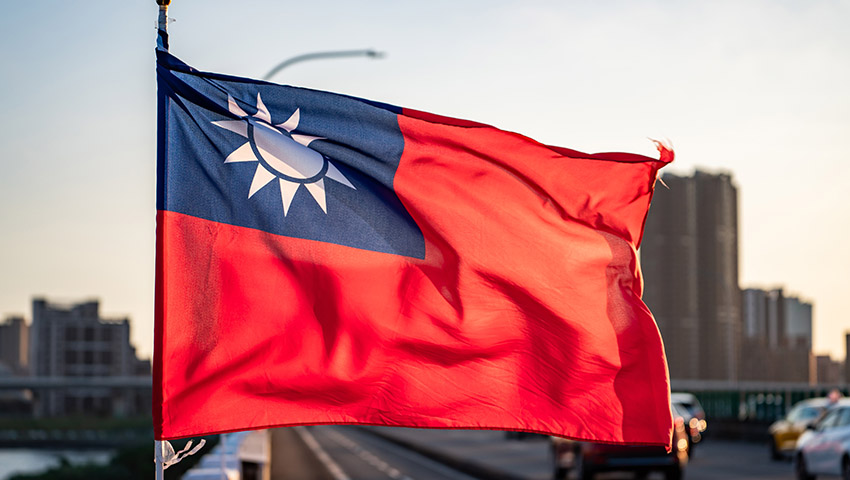How should the West respond to the increasingly precarious stand-off between Beijing and Taipei?
Military intimidation and inflamed rhetoric dominate the current geostrategic environment in the Indo-Pacific, with China’s continued efforts to undermine Taiwanese independence stoking fears of a major conflict embroiling the world’s great powers.
In his keynote address to the Shangri-La Dialogue in Singapore earlier this month, Japanese Prime Minister Fumio Kishida ominously warned, “Ukraine today may be East Asia tomorrow”.
Just a week later, Taiwan’s Ministry of National Defense issued a report revealing 29 Chinese People’s Liberation Army Air Force (PLAAF) aircraft breached its southern air defence identification zone (ADIZ).
The Chinese contingent reportedly included Shenyang J-16, Sukhoi Su-30, and Shenyang J-11 fighter jets, as well as a Xian H-6 bomber and Shaanxi Y-9 electronic warfare aircraft.
In response to the incursion, Taiwan deployed combat air patrol aircraft, issued radio warnings, and deployed air defence missile systems to monitor the PLAAF fleet’s activities.
This was one of the largest reported breaches this year, following continued incursions since January 2021.
Taiwan Foreign Minister Joseph Wu said the incident demonstrates China’s military is “more serious than ever”.
“But there’s no way Taiwan will cave in & surrender its sovereignty & democracy to the big bully. Not a chance!” Wu said on Twitter.
Beijing has publicly expressed plans to absorb Taiwan into its mainland and has warned the West not to intervene.
Chinese Defence Minister Wei Fenghe is on record stating, “We will fight at all costs and we will fight to the very end. This is the only choice for China.”
So, given the threat to global peace and security posed by these polarising attitudes, how can the West ease tensions without kowtowing to Beijing?
According to Natasha Kassam, director of public opinion and the foreign policy program at the Lowy Institute, China’s inflammatory rhetoric “seeks to deter, not reassure”.
She claims the US, Australia, and other like-minded countries “must match China’s escalation” to “present a credible deterrent”, which need to be carefully calibrated to avoid further escalation.
Kassam commends the recently struck trade initiative between the US and Taiwan, and the upcoming high-level US visit to Taipei.
While acknowledging the effectiveness of AUKUS, Kassam claims Australia “could do much more” on the economic and diplomatic front.
This, she adds, could include support for Taiwan’s inclusion in the Comprehensive and Progressive Agreement for Trans-Pacific Partnership.
“Closer economic ties with Taiwan would benefit Australia, with the added bonus of being less likely to unnerve regional partners than military platforms and security partnerships,” she writes.
Moreover, Kassam argues the West must act pre-emptively, well ahead of a Chinese move on Taiwan.
“China’s goals for Taiwan are clear, even if its timelines and tactics are not. It still seems more likely that China will seek to coerce Taiwan into submission, rather than invade the island,” she writes.
“But there’s no doubt that the People’s Liberation Army is developing the capability to make invasion a plausible last resort.”
She notes while comparisons to the Russia-Ukraine crisis are limited, the illicit invasion of Ukraine is a “powerful reminder that waiting until the first shot is fired is far too late”.
Kassam cites Ukrainian President Volodymyr Zelensky, who delivered a video address to the Shangri-La Dialogue, stating: “We must not leave them behind at the mercy of another country which is more powerful in financial terms, in territorial terms and in terms of equipment,” Zelensky said.
“And therefore, if there is a way out diplomatically, we need to use the diplomatic way. But it must be a pre-emptive way, not the one that comes after the war has started.”
Kassam warns the chances of a diplomatic resolution to China-Taiwan tensions are “remote” but adds “all efforts need to be made now” before Chinese invasion forces amass in Fujian.
She concludes: “Both superpowers spent last weekend talking about Taiwan. Both are still having completely different conversations, with different audiences.
“Dialogue is better than its absence, but the region is heading for much more dangerous waters.”
Get involved with the discussion and let us know your thoughts on Australia’s future role and position in the Indo-Pacific region and what you would like to see from Australia's political leaders in terms of partisan and bipartisan agenda setting in the comments section below, or get in touch with









